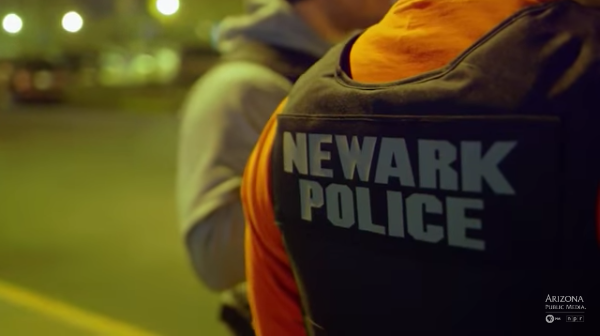‘Frontline’ Asks, Who Will Police the Police?

Photo: PBS
I’d call Tuesday night’s Frontline episode, Policing the Police, an eye opener, something of a revelation, except all that would reveal is my own ignorance about how routinely black citizens are mistreated by law enforcement in this country. As presented by writer, narrator, and onscreen participant Jelani Cobb, Policing the Police follows Cobb as he travels around Newark, N.J., with members of the Newark Police Department and Mayor Ras Baraka. No matter how knowledgeable and/or cynical you may be, it is startling to see cops — knowing the Frontline cameras are rolling — pulling up on young black men and taking them to the ground because … well, they looked suspicious.
Cobb, a staff writer for the New Yorker (read his July 4 piece on the House of Representatives’ sit-in over gun-control legislation), decided to explore Newark’s police department for a number of reasons. The most theoretical is that, as he puts it, he regards “interactions between civilians and police a gauge of race relations in this country.” More immediately, he pursued Newark both because he is familiar with the city and some of its inhabitants (he mentions that he went to college with Mayor Baraka) and because a three-year investigation of the Newark Police Department by the Department of Justice found “systemic civil rights abuses” and that approximately 75 percent of stops by officers had no legal justification.
But this is television, and the visuals do a lot of Cobb’s work for him. During a nighttime ride-along with a couple of genial-seeming officers, Cobb witnesses a young black man thrown to the ground and cuffed — “for your safety and ours,” one cop says to the man — before proper questioning even begins. Despite the man’s initial protest that he wasn’t doing anything wrong and his cries of “I don’t have a gun!,” it is presumed that he may be armed and dangerous before it’s made clear just what criminal activity the police suspect him of doing. (Possession of drugs, it turns out: The cops tell the man that his friend had a small amount of cocaine on him, but they find nothing on the man himself.)
Newsletter: The Yodel
Trusted news and daily delights, right in your inbox
See for yourself — The Yodel is the go-to source for daily news, entertainment and feel-good stories.
Cobb moves on to the legislative level, attending public hearings for residents who want a civilian-led “police accountability” committee formed. He is also privy to some conversations Baraka holds with his newly appointed police director, Eugene Venable, talks that turn tense when Baraka’s handpicked man cannot come up with a clear vision for reforming the force or explain the poor response time of police to 911 calls in certain poor neighborhoods. (A voiceover later reveals that Venable was moved out of his position soon after the scenes were filmed.) It should be said that Baraka — the son of the superb poet-critic Amiri Baraka — comes off well throughout: a shrewd politician who uses those skills for as much public good as can be inserted into what looks like an impossible job.
Cobb’s Frontline report is certainly a downbeat one. He agrees with one cop that the police department is “underfunded and overstretched,” but one of Cobb’s despairing bottom-line conclusions is that, “It’s clear to me that there is no trust [between police and citizens] … everyone assumes the worst of everyone else.”
You turn away from this hour wondering: Is this any way to run a city? Is this any way to run a country?
Frontline: Policing the Police airs Tuesday at 10 p.m. (check local listings) on PBS.
Solve the daily Crossword


